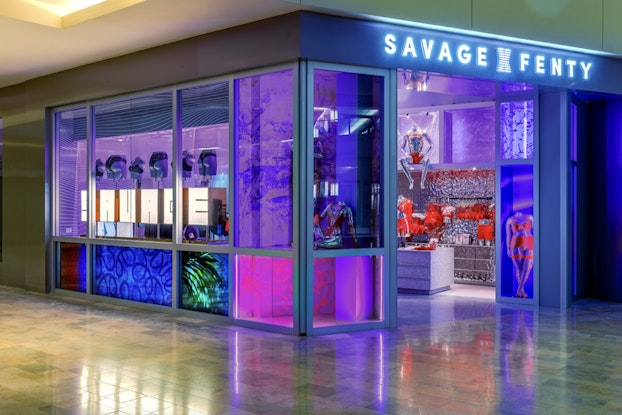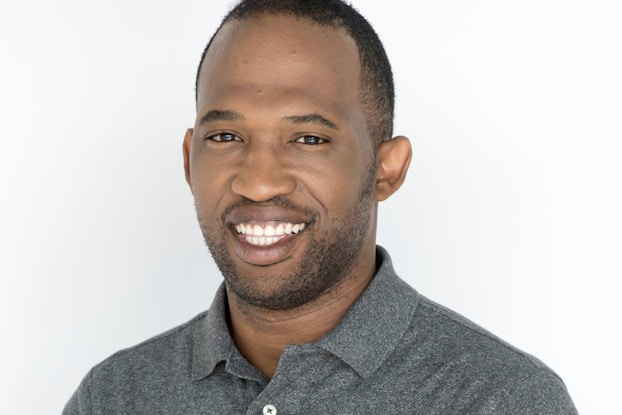How one fashion-tech startup built a multimillion-dollar business from scratch:
- Founder Haniff Brown conceived FIT:MATCH to solve an unmet market need: The touch-free tech captures a shopper’s exact body shape to recommend the best-fitting apparel for each customer, saving shoppers the hassle of trying on clothes while reducing costly product returns for brands.
- Brown then built exposure for FIT:MATCH by hiring a fashion business insider to introduce the apparel-match tech to influential designers, which granted the startup industry access, credibility and landed the tech in major malls around the country.
- That exposure got the attention of Rihanna’s Savage X Fenty brand, which is rolling out FIT:MATCH tech to its stores, with plans to expand the technology solution to other brands this year, too.
Augmented reality-tech startup FIT:MATCH launched in 2018 to help shoppers find apparel from jeans to lingerie that mirrors their precise body shape — without having to try on a single item.
In 2019, the startup’s full-body scanning studios, which captured 150 data points of a consumer from head to toe in about 10 seconds, debuted in Brookfield malls, then small pop-up collaborations with brands such as Macy’s and Vineyard Vines followed.
FIT:MATCH has since mushroomed into a multimillion-dollar business that’s now shifting into hyper-growth mode: In January, the startup secured a major investment from Rihanna’s Savage X Fenty brand to roll out its apparel-match tech to the brand's stores, as well as other fashion brands and retailers, too. Athleisure disruptor Fabletics has also invested in the company.
With its promise to serve up clothes that offer the perfect fit, FIT:MATCH leans into the trend toward evermore personalized products and services — from in-home closet organizing specialists dispatched by The Container Store to custom-made conditioner from Prose to fashions curated just for you by Stitch Fix.
FIT:MATCH’s AR-powered platform, for its part, captures a shopper’s exact body shape via store-associate-enabled smartphones, Haniff Brown, founder and CEO of the startup, told CO—. “And our algorithms use that data to recommend the best fitting products.”
[Read: The Tech Innovations Set to Take Off in 2022 Aimed at Pandemic-Changed Shoppers]

Solutions that slay fashion’s pain points: The hassle of trying on clothes and the high cost of product returns
FIT:MATCH is the brainchild of Brown, who conceived the contactless technology platform to solve increasingly thorny issues for retailers: Amid the surge in online shopping, product returns cost retailers an estimated $761 billion in merchandise last year, according to the National Retail Federation.
Brown saw firsthand the big expense incurred by merchants from returned clothing while working in investment banking and private equity as a retail specialist.
He also got a taste of the inconvenience and headaches shoppers face when he was tasked with returning clothes for his own mother. Those experiences inspired FIT:MATCH, which today is focused on “hard-to-fit garments that consumers have a particularly difficult and unpleasant time [with] finding their right size via traditional methods,” he said. “These are also categories where fit — not style or color — is disproportionately important to overall shopper satisfaction with the product purchase, from bras and denim to performance activewear and swimwear.”

Forging a path to big retail by ‘finding hacks that work’
According to Brown, FIT:MATCH is differentiated from the wave of fashion fit tech startups hitting the market because it uses body shape data, rather than standard apparel measurements, to recommend the best-fitting product sizes and styles for each customer.
Although Brown came from the world of investment banking with a retail focus, getting the industry to buy into the apparel-match platform proved challenging.
“We sort of had to claw our way into the conversation,” he said.
Brown launched a local grassroots effort to drum up support for FIT:MATCH in the Miami market by pitching the platform directly to small, influential designers there.
Hiring fashion business expert and founder of Miami Fashion Week Beth Sobol as a consultant proved invaluable to that effort. Sobol introduced FIT:MATCH to local designers such as Viviana Gabeiras and Julian Chang, granting the tech exposure and credibility, which was a critical first step in convincing these brands to sign on.
As FIT:MATCH aims to not only save consumers the fuss of trying on clothes, but also save brands the expense of processing product returns, “the lower return rate was the hook” that ultimately sealed the deal, as steep return costs hit small brands particularly hard, he said.
With local designers on board, a FIT:MATCH scanning studio bowed in the Shops at Merrick Park in Coral Gables, Florida, featuring the boutique brands that said “yes.”
For startups seeking a foot in the proverbial door, “it’s about figuring out that creative angle that will distinguish you, and let you leapfrog obstacles to access, and finding these hacks that work,” he said.
[Read: How 3 Startups Achieved Exponential Growth During the Pandemic]
For startups seeking a foot in the proverbial door, “it’s about figuring out that creative angle that will distinguish you, and let you leapfrog obstacles to access, and finding these hacks that work.Haniff Brown, founder and CEO, FIT:MATCH
‘The lightbulb moment’: Pivoting from a marketplace model to working directly with brands
FIT:MATCH then opened mall-based pop-ups across the country in Houston, Chicago, Dallas and Los Angeles, working with 10 third-party brands while building out its tech infrastructure along the way.
Then the requests started trickling in: “Large brands would ask us if we could come into their stores to build similar experiences directly for them,” Brown said.
The pandemic only boosted that demand. As consumers flocked to contactless shopping solutions, “brands had to accelerate their investment in technology like ours as COVID tested their boundaries,” he said.
“That’s when a lightbulb went off and we knew that eventually we would evolve our model into a B2B technology platform and solely service large brands and retailers.”
When Los Angeles-based Savage X Fenty spotted FIT:MATCH’s pop-up experience in its market, “We realized we had a shared vision about building a truly innovative retail experience,” he said.
FIT:MATCH’s Fit Xperience is now rolling out to Savage X Fenty U.S. stores across the country, and customers will eventually gain access to the tech online and via mobile apps, Brown said.
“They [Savage X Fenty] believed and shared in our vision so much, that they also made an investment to help accelerate the development of the platform to other brands,” Brown said.

The funding factor: ‘You can’t just pick up the phone and call your uncle’
For FIT:MATCH, finding investors early on wasn’t easy. “I’m not based in Silicon Valley,” Brown said. “And fundraising as a minority is a challenge.”
That comes as little surprise, as minority startups are woefully underfunded: Black and brown entrepreneurs, for example, received a mere 2.6% of the funding that went to all founders in 2020.
Without a network, “you can’t just pick up the phone and call your uncle and say, ‘Can you get me a meeting with this person?’” he said. “You can’t just literally go and raise a bunch of capital through straightforward methods.”
At the same time, Brown believes capital constraints forced FIT:MATCH to build a much stronger business — one that’s been battle-tested to hone its product-market fit, he said.
Looking ahead, “The goal is to white label the [tech] solution for the broader industry over time, which would in turn benefit all our partners as a whole,” Brown said. “We’re also expanding into denim, activewear and the shapewear and uniform businesses. We are just scratching the surface.”
CO— aims to bring you inspiration from leading respected experts. However, before making any business decision, you should consult a professional who can advise you based on your individual situation.
Follow us on Instagram for more expert tips & business owners’ stories.
CO—is committed to helping you start, run and grow your small business. Learn more about the benefits of small business membership in the U.S. Chamber of Commerce, here.









